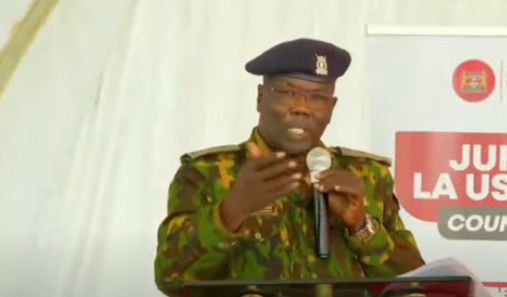

A light-hearted moment broke out during a security meeting in Siaya County when Simon Rotich, Officer Commanding Station (OCS) at Akala Police Station in Gem, candidly expressed frustration over the police’s long-standing reputation as Kenya’s most corrupt institution.
Speaking at a gathering convened by Interior Cabinet Secretary Kipchumba Murkomen, Rotich said police officers are tired of being ranked number one in corruption surveys and expressed a desire for change.
“We have been number one for too long, and we need to drop in the ranking. We need to be number 10, 11 or thereabouts,” Rotich said, drawing chuckles from the attendees.
The meeting, held under the Jukwaa la Usalama forum, brought together top police officials and National Government Administration Officers to discuss security matters in the region.
Rotich also highlighted that corruption within the police is not a one-sided issue.
He noted that some members of the public willingly offer bribes to officers, even without being solicited.
“The public should also be ranked because there is a belief that when you go to a police station, you must carry something to give to officers as a bribe,” Rotich explained.
He further emphasised that many police officers and local chiefs maintain integrity and professionalism, countering the widespread negative perceptions.
The Kenyan police have for years been under scrutiny for corruption, consistently topping lists of corrupt institutions in the country.
Surveys and reports have highlighted issues such as bribery during traffic stops, extortion, illegal detention, and collusion with criminal networks.
These systemic challenges have eroded public trust and painted the police as prioritising personal gain over their mandate to protect and serve.
Efforts to reform the police and root out corruption
continue, but progress remains slow due to entrenched institutional weaknesses,
limited accountability, and political interference.
As discussions like those in Siaya continue, there is hope that greater openness and acknowledgement of the problem — including the role played by both police and the public — will pave the way for meaningful reforms.












